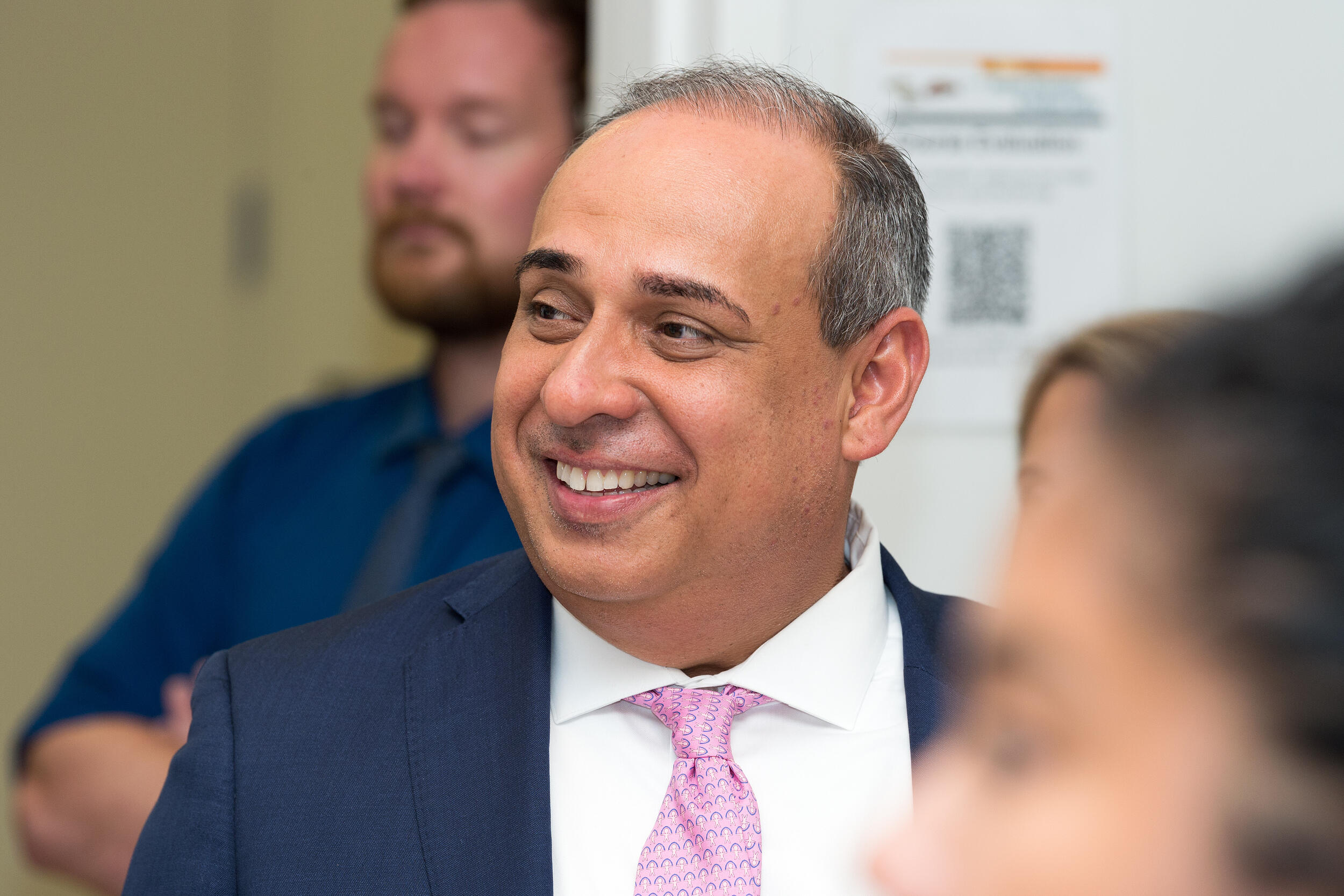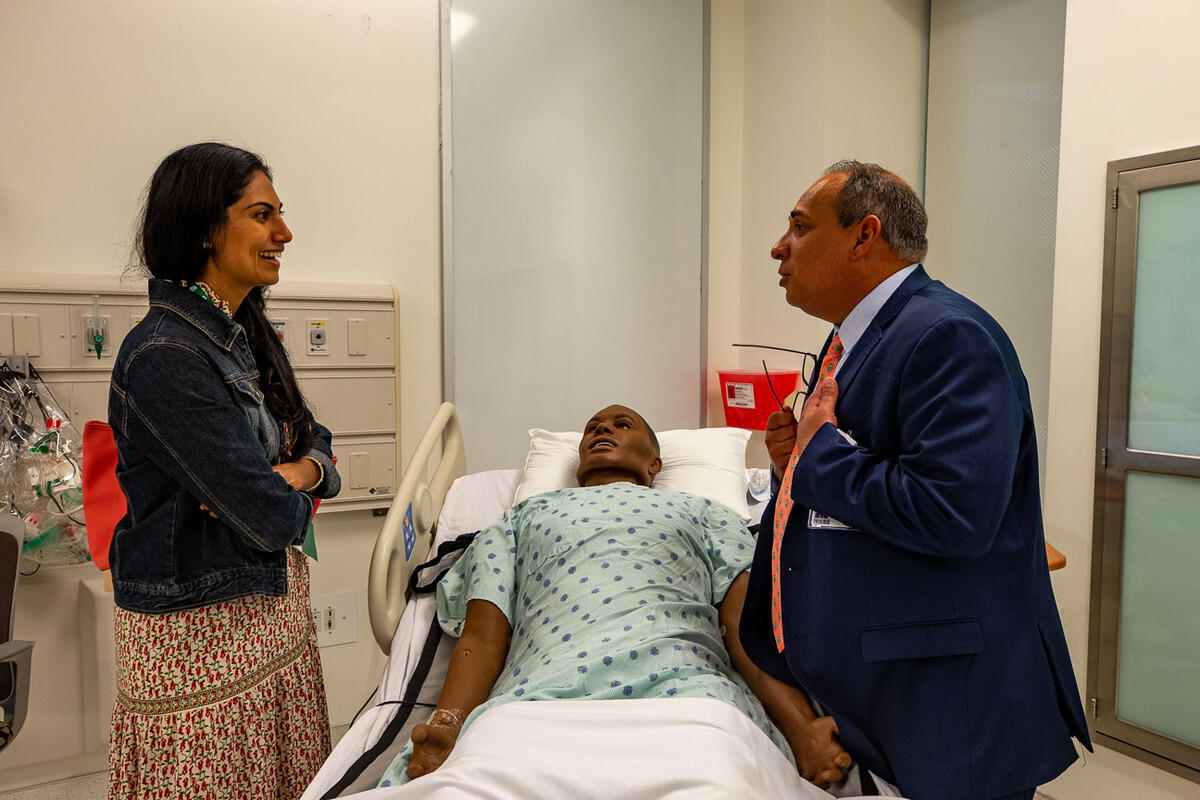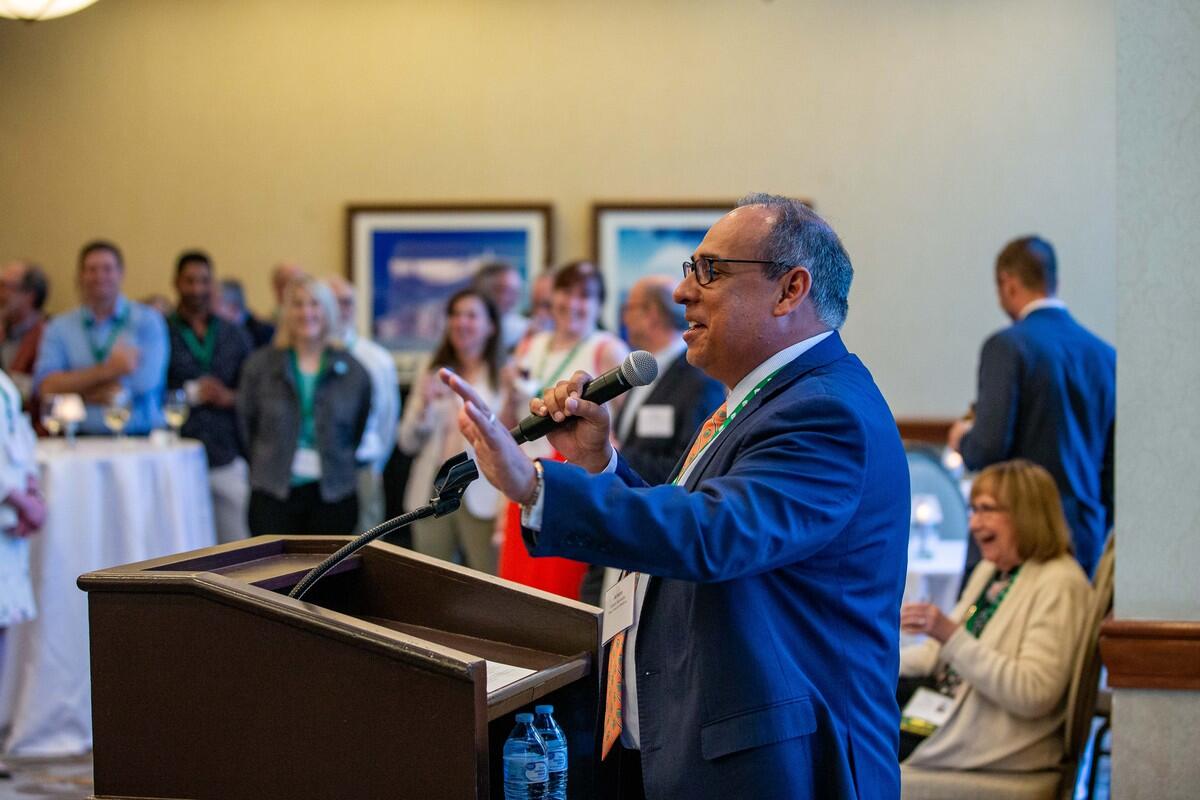
Jan. 31, 2024
Art Saavedra brings people-first approach to his role as dean of School of Medicine
Share this story
Arturo P. “Art” Saavedra, M.D., Ph.D., never planned to become a doctor. He saw what was demanded of his physician parents in the small Puerto Rican community where he grew up and shied away from medicine. Instead, he set his sights on space and rockets.
But after a chance encounter in his teens, Saavedra changed course. He decided to pursue medicine after all — and do it his own way. Now he’s brought his people-first approach to his role as dean of the School of Medicine and executive vice president at VCU Health System.
One might say his journey to the MCV Campus all started because of the space shuttle.
As a science-oriented youth, Saavedra wrote a computer program to support space shuttle landings. It drew the attention of NASA and an invitation to the International Science and Engineering Fair.
That experience led to an invitation to the 1990 Nobel Prize ceremony, where he met the winner for physiology or medicine: transplant surgeon Joseph Murray, M.D. Hearing about his work, Saavedra gained a new appreciation for the life-changing power of medicine and, with Murray’s encouragement, upended his plans for space and returned his attention to earth.
Saavedra completed high school early and at age 15 began attending Harvard University, where he graduated magna cum laude from Harvard College with a degree in biological sciences. He then received combined medical and doctoral degrees from University of Pennsylvania with specialized training in pharmacology. After completing residency training in internal medicine at Brigham and Women’s Hospital, Saavedra graduated from the Harvard Combined Dermatology Residency Training Program and completed his fellowship in dermatopathology.
He worked in Boston before moving to Virginia in 2017 to serve as chair of the University of Virginia’s dermatology department. Saavedra also led the physician’s group and served as chief of population health and health policy for UVA.
He landed on the MCV Campus in April 2023, determined to inspire a new generation of physicians with his boundless enthusiasm and big ideas.
“There’s a lot of energy in really challenging traditional ways of teaching,” he said.

Making the rounds
In an age of telemedicine and Zoom meetings, Saavedra values meeting in person. “I’m an extrovert by nature,” he said. “Some people relax by being alone, but I relax by being around people. I think it’s best to get your message across with eye contact and a handshake.”
Since arriving on the MCV Campus, he has liked nothing better than getting to know new colleagues and students, and checking out their work — in the classroom, the clinic or the lab.
He’s held countless meetings with faculty, community leaders, legislators, alumni, patients and others in his orbit. He’s known for his “Art walks” around campus, where he tags members of the university community for conversation and fresh air.
After a tough couple of years, Saavedra hears that people are ready to move ahead and work together postpandemic.
Michael Roussos, president of VCU Medical Center, said he’s been impressed with Saavedra’s willingness to collaborate and his can-do demeanor from Day 1.
“His approach is very hands-on and, at a time like this, that’s important and a significant advantage,” he said. “He’s a valued partner, and together we can make the experience for trainees, patients and team members even stronger.”
Teamwork is essential in medicine, Saavedra agrees. “It’s not just something we teach in the classroom or research lab. We should live it. Sometimes that alignment, though essential, is hard to do. But there is negotiation, give and take. You have to share a vision.”
He also sets an example for future physicians by encouraging them to see people first, conditions second.
“I really like to start the patient interview with something personal. In medical school, you’re typically taught to start with the present illness, history and medications. There’s an order to it. The social and family history goes at the end.
“I invert that. I ask about where they work, health problems, tell me about your family. And I do find that patients react best when you’re meeting them like a person, not like a disease or the problem they’re having.”
A training ground for success
One of Saavedra’s first priorities on campus is reimagining the basic sciences and medical education curriculums. His Ph.D. in pharmacology gives him great respect for the skill set that’s honed in the lab, and he plans to incorporate research and trials into the gradient of clinical studies. “I don’t see these as separate fields,” he said. “This will improve both laboratory research and patient care.”
Saavedra’s plans also include ensuring the future physician workforce is ready to care for today’s diverse patient population, especially the underserved — an area where the MCV Campus’ track record is well known. That might mean taking some classroom lessons such as hypertension management directly to patients in the community.
Saavedra has big plans, but he also realizes he’s facing some big obstacles. Physician burnout is very real, he said. “But I don’t think it’s just about working too hard. Let’s face it, people who get to medical school do work hard. It’s about having enough time off to be a person, to refuel so when you get back to work, you are yourself again. Doctors carry a lot of weight.
“Most doctors won’t say this, but I will: We have a lot to learn from our colleagues in nursing. Nurses have found ways of treating patients, caring about them — but allowing pass-offs. The model there is a model of very significant care but also sharing in the care. This perspective that we are the only person who can do everything all the time is going to have to be something we think harder about.”
Recognizing and retaining faculty and raising employee satisfaction, he said, is another imperative. “We want people to be successful because of the system, not in spite of it,” he said.
Sharing life lessons
It’s important to Saavedra to empower students to manage challenges they’ll face in attaining a work-life balance, and he’s not afraid to share personal stories of his own.
“I was meeting with medical students when I first came to campus and one asked me to talk about a time I struggled,” he said. Saavedra recalled years back when a relationship was falling apart at the same time a parent was seriously ill.
“First, I thought, ‘What should a dean say?’ But then I thought, ‘What should Art say?’ That moment was one when it became clear I couldn’t say something elegant. I had to go to a deeply personal level.
“I told them how my initial reaction was to just keep working hard and to think that I could handle it all. But I wore myself down. Thankfully, friends and colleagues were there to encourage me to think about my life priorities.”
Family and friends help keep him grounded, along with furry companions, a rescue dog, Trooper, and a bluetick coonhound, Patches. At different points throughout his career, he’s refueled through music festivals, travel and an active lifestyle — qualifying for the Kona Ironman World Championship in 2012 (sadly, a major injury has since ended Saavedra’s triathlon career).

Accomplished scholar, clinician and colleague
As a dermatologist, Saavedra is noted for both his bedside manner and for his treatment of patients who lack a normal immune system, including transplant patients and patients with HIV. He serves as senior editor of Fitzpatrick’s Color Atlas and Synopsis of Clinical Dermatology, the most widely read dermatology atlas for diagnosis and treatment of skin conditions.
Attorney Whittington W. Clement, a former member of Virginia’s House of Delegates, served as rector of UVA Health during Saavedra’s tenure. Though sad to see him leave Charlottesville, he said Saavedra’s empathy and interpersonal skills make him the right person to help guide the medical school and health system through a post-COVID world.
“I knew Dr. Saavedra first as my physician, but he soon became my friend,” said Clement, who still sees him for care. “It became clear to me that he was more than just a very good dermatologist. He had great insights into the health system and was recognized by his peers. I was delighted when he chose to do more than chair the dermatology department and step up to be a leader of the physicians group.
“Under his leadership, we were better able to align the doctors with the medical center. Art brought all the parties together and really earned his spurs. He won the respect of everyone.”
Why Richmond? Why now?
In addition to falling in love with Richmond, Saavedra quickly decided that the MCV Campus felt like home — so much so that he’s purchased a house in a nearby Church Hill neighborhood. He hopes VCU will be a model for the nation, and he’s confident the School of Medicine and the health system are on the right path.
“Our goal is to offer the right care at the right place at the right time to the right patient.
“I’m already very proud of this place — not that I created it, of course, because I’m new. We have our challenges, like any space, but the heart of this health system is in the right place.”
Grateful for inspiration and support
Spanish-born Saavedra wouldn’t be the physician leader he is today without the support he’s received, from teachers who encouraged him, to a Nobel laureate taking him under his wing, to a grateful patient who created an endowment to support his research.
Now, he works to pay it forward — and inspire others to do the same. “Incredible things happen when you care about people,” he said.
Saavedra calls philanthropy “a partnership with society.” Though fundraising is part of his job, he said that meeting alumni and friends is one of his favorite activities. “They all have a story,” he muses. “And I like to hear those.”
Giving back is his way to show gratitude for all he’s been able to accomplish. “I think of it as a moral imperative to be a part of something bigger. This mission, this need, survives all of us.”
This story was published in the winter 2023-24 issue of 12th & Marshall. You can find the current and past issues online.
Subscribe to VCU News
Subscribe to VCU News at newsletter.vcu.edu and receive a selection of stories, videos, photos, news clips and event listings in your inbox.







